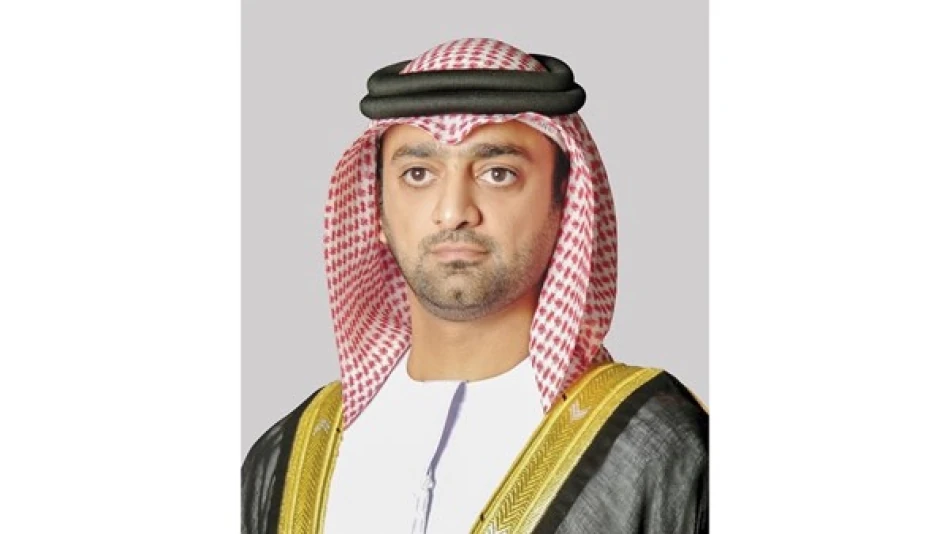
Emirati Trailblazer: 50 Years of Glory and Service - The Remarkable Journey of Amar Bin Hamid's Daughter
UAE Crown Prince Champions Women's Empowerment as Nation Marks 50 Years of Gender Progress
Sheikh Ammar bin Humaid Al Nuaimi, Crown Prince of Ajman and Chairman of the Executive Council, has declared Emirati Women's Day a cornerstone celebration reflecting five decades of systematic female empowerment that positions the UAE as a global leader in gender equality. His remarks coincide with the 50th anniversary of the General Women's Union, underscoring how strategic institutional support has transformed the Emirates into the Arab world's top performer for women in leadership positions.
Half a Century of Institutional Foundation
The Crown Prince's statement highlights a critical milestone: 2024 marks 50 years since the establishment of the General Women's Union under the leadership of Sheikha Fatima bint Mubarak, widely known as the "Mother of the Nation." This institution has served as the architectural foundation for women's advancement across the UAE, creating a systematic approach to gender empowerment that distinguishes the Emirates from regional peers.
The timing is strategically significant. As the UAE prepares for its "Year of Community" initiative in 2025, the government is positioning women's participation as central to its social and economic vision, moving beyond symbolic gestures toward measurable policy outcomes.
Economic and Political Integration Strategy
Leadership Representation Metrics
The UAE's approach differs markedly from other Gulf states through its emphasis on quantifiable political and economic participation. While the Crown Prince noted the UAE leads the Arab world in women's representation across all sectors, this reflects deliberate policy choices rather than cultural evolution alone.
The Emirates has consistently outperformed regional competitors on international gender equality indices, a critical factor for attracting foreign investment and maintaining its position as a global business hub. This economic imperative drives policy decisions that extend far beyond social considerations.
Comparative Regional Context
Unlike Saudi Arabia's recent rapid reforms or Qatar's more conservative approach, the UAE has pursued incremental, institution-based empowerment over five decades. This methodology has created sustainable change without the social disruption seen in neighboring countries implementing faster transitions.
The "Hand in Hand" Framework for 2025
The Crown Prince's emphasis on the "Hand in Hand, We Celebrate Fifty" theme signals a shift toward collaborative governance models. This approach recognizes that the UAE's next phase of development requires maximizing human capital utilization across gender lines, particularly as the nation diversifies away from oil dependency.
The declaration of 2025 as the "Year of Community" creates institutional momentum for expanded women's participation in economic sectors where the UAE seeks competitive advantage, including technology, renewable energy, and financial services.
Strategic Implications for National Development
Economic Competitiveness Angle
The Crown Prince's statement that "the measure of any nation's civilization and progress lies in its respect for women" reflects pragmatic recognition that gender equality correlates with economic performance. Countries with higher female workforce participation typically demonstrate stronger GDP growth and innovation metrics.
For the UAE's Vision 2071 goals, women's leadership becomes essential for achieving knowledge economy objectives. The Emirates cannot maintain its regional hub status while underutilizing half its human capital.
International Positioning
By emphasizing measurable achievements over aspirational rhetoric, the UAE distinguishes itself in international forums where gender equality increasingly influences trade relationships, investment decisions, and diplomatic partnerships. This positioning becomes particularly valuable as ESG criteria shape global capital flows.
Looking Forward: Institutional Sustainability
The Crown Prince's commitment to supporting "every initiative that elevates women's status and enhances their leadership opportunities" suggests continued policy evolution rather than static achievement. This approach recognizes that maintaining regional leadership requires ongoing institutional adaptation.
As the UAE approaches its next development phase, the integration of women's advancement with broader national objectives demonstrates sophisticated policy coordination. The success of this model will likely influence approaches across the Gulf region, making the Emirates' experience a critical case study for sustainable gender empowerment in traditional societies.
Most Viewed News

 Layla Al Mansoori
Layla Al Mansoori






